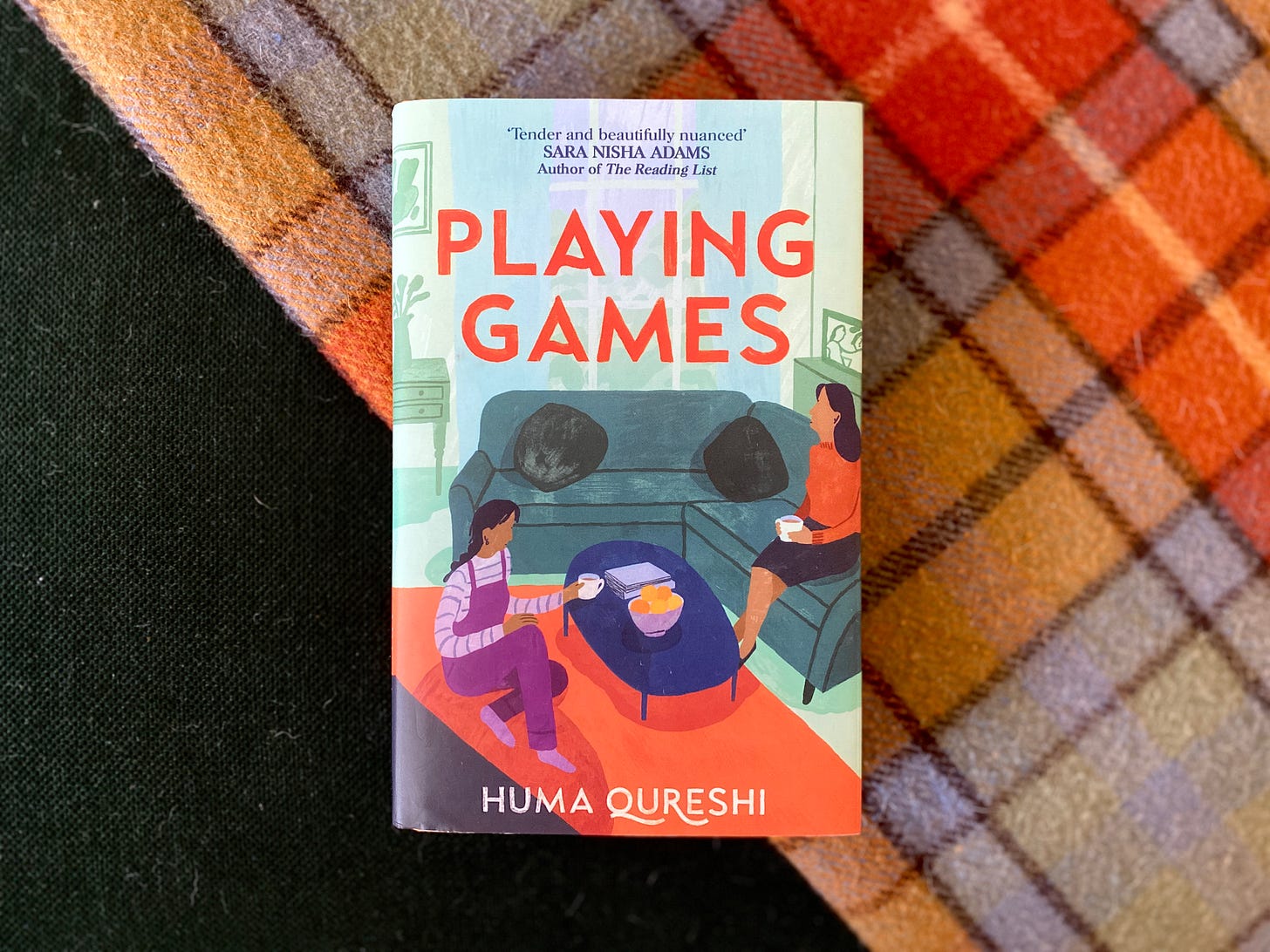Chapter 7: Playing Games by Huma Qureshi
Can you use your sister's story as inspiration for your art?
As I read Playing Games, I started to feel that familiar itch to write about books again. Of course, I already talk about books a lot on
and in my job as a bookseller.But it’s been a good few months since I’ve felt I had the bandwidth to try and summarise my often jumbled discussions into a (hopefully) coherent review. I think the notion of ‘reviewing’ feels like a hurdle: I feel out of practice with something that used to come so naturally, or maybe I’m feeling more self-conscious now?
Anyway, Playing Games was on my radar after hearing so many wonderful things about
fromA central element of Playing Games is the question of whether you can be artistically inspired by a story that may not be yours to tell. A few chapters in, it dawned on me that it’s the third novel I’ve read in 2023, which asks us to consider this question in some form.
I toyed with writing about all three books in a post. The more I read, though, the more I felt like I had to dedicate space and words to this beautifully crafted contemporary novel. (Don’t worry, I’ll share the other two books at the end of this post).
Right, enough faffing. Let me tell you about Playing Games.
Hana is a lawyer on track to make partner, with a beautiful home and seemingly wonderful marriage. Her sister Mira is an aspiring playwright who works in a cafe and doesn’t get along with her flatmate. They often feel like there’s a world between them, wondering how they’re related when sometimes they just don’t get each other.
One night, Mira overhears Hana and her husband arguing about whether they want children. It feels intimate – Hana so rarely exposes her vulnerabilities. Mira knows she probably shouldn’t be inspired by their words, yet she also feels the seed of an idea forming for a play.
Over the course of the novel, we slide between Hana and Mira as they deal with love, heartbreak and their relationship as sisters.
All the characters are so nuanced, especially Hana and Mira – we’re never asked to take one sister’s side. The writing helps this, with perspective shifting between each woman.
I also appreciated seeing a sibling relationship with constant friction between love and frustration, even anger. Relationships like this can feel simplified sometimes: super close families, or those who barely talk. But what about the in-between?
What struck me about this book, and sparked so many reflective moments about my own personality, was the disconnect Hana often felt between what she wanted to say and what came out. My heart ached for her when she wanted to be vulnerable but sounded abrasive and harsh instead because I know this is one of my worst traits, too, especially with family.
We follow Mira writing her play throughout the novel, and I absolutely loved how the feeling of creative flow was represented. Qureshi nails the happiness, the lightness of finally hitting your stride after a dry patch (where you’re convinced you’ll never write again).
Playing Games is the subtly crafted contemporary fiction I love, with tricky, emotional and uncomfortable characters. People who do things you don’t always agree with but feel compelled to follow. The writing is elegant and vivid, and the storytelling immersive. I’ll absolutely be reading Qureshi’s short story collection, Things We Do Not Tell the People We Love, while I long for another of her novels.
We were delighted to speak about Playing Games on Better Words. Listen to the interview below or find it in your favourite podcast app. Thank you to Sceptre Books for providing a copy of the book in preparation for the interview.
More on this topic
Yellowface by Rebecca Kuang*
This was one of the most talked-about novels of the year and, in my opinion, absolutely worthy of the praise. It’s a sharp, darkly comedic analysis of the publishing world. I was gripped from the first chapter, where protagonist June steals a manuscript from a fellow writer, Athena, who chokes to death while they’re having dinner.
This, however, is not the theft I was reminded of while reading Playing Games. As the novel unfolds, June questions whether Athena also ‘stole’ stories by hearing from people in her community and using their painful experiences as inspiration for her writing.
Between Us by Mhairi McFarlane*
This takes the question of blurred lines of inspiration and puts a rom-com spin on it. When Roisin and her friends sit down to watch the first episode of her screenwriter boyfriend’s new crime drama, she’s horrified to see her deepest secret played out on screen. As the show continues, Roisin questions whether other storylines (like an affair) are also inspired by actual events.
Mhairi McFarlane is one of my favourite writers, so I’ll always recommend her novels. They’re always a superb blend of romance, humour and depth of character. We had the pleasure of interviewing her a while ago, so I’ll share that podcast below.
I received copies of both the above books from HarperCollins Australia.





I love Huma Qureshi’s work and was thrilled to see her book featured in your newsletter. I did a short story writing course with her a while back and it was excellent.